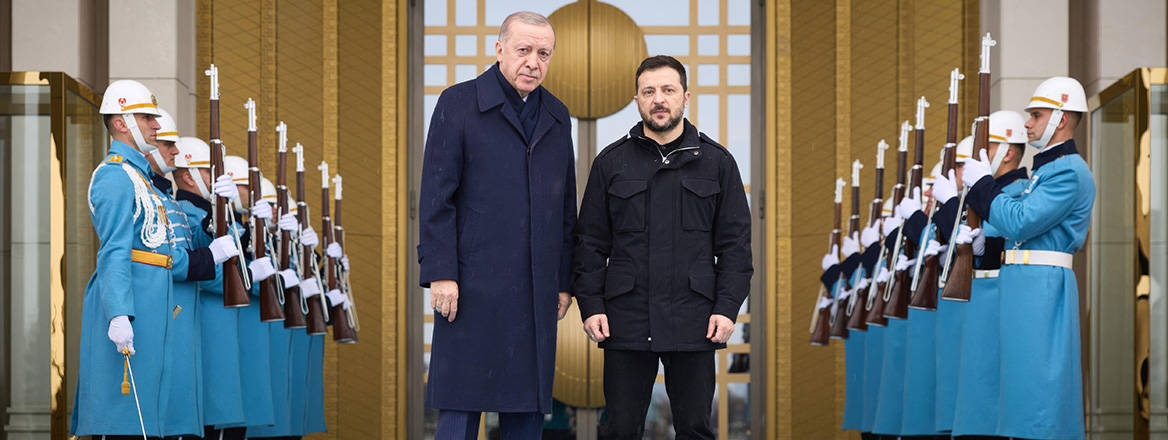Does Turkey Have the Capacity to Address its Critical Agendas?
Turkey has the opportunity to play an outsized role in the global theatre, but my be undercut by internal challenges.
In recent weeks, Turkey has experienced various level of political and diplomatic activity that could normally span several years in any other country’s agenda.
For instance, On May 12, the Kurdistan Workers’ Party (PKK) announced that it would lay down arms, ending four decades of political and militant action, in response to a call from its imprisoned leader, Abdullah Öcalan.
Just a week prior to this development, Turkey was mentioned during the Informal Meeting of EU Foreign Ministers held in Poland as a country that could play a pivotal role – both at the negotiation table and on the ground – in the Russia-Ukraine peace process.
Subsequently, Turkish Foreign Minister Hakan Fidan hosted an informal meeting of NATO foreign ministers, and shortly thereafter, brought together Russian and Ukrainian delegations at the same table for the first time in a long while, facilitating discussions on a ceasefire, prisoner exchange, and post-conflict processes.
Undoubtedly, these are highly complex and demanding issues. However, this might merely represent the visible portion of a much deeper and more complex set of underlying dynamics.
Nevertheless, on May 20, Turkey participated – at the level of deputy foreign minister – in a trilateral summit with the United States and Syria held in Washington, engaging in discussions concerning the regulation of ISIS detention facilities.
Simultaneously, Turkey is preparing to launch negotiations for a Free Trade Agreement with the United Kingdom during the summer and will also take part in the second round of Cyprus negotiations scheduled to be held in Geneva in July.
In short, just as the past weeks have been marked by intense diplomatic activity, Turkey’s upcoming agenda is similarly packed, and likely to be shaped by a parallel diplomacy dynamic. This density of engagement, of course, stems from Turkey’s geographical location and geostrategic significance.
Yet, the more critical question is whether Turkey possesses the institutional capacity to effectively manage and digest such a heavy and multidimensional agenda. The outcomes of these developments will not only affect Turkey but also carry significant implications for regional stability and the broader international order.
The Issues of Syria and the PKK Constitute an Intertwined and Deeply Rooted Entanglement
In the final quarter of 2024, Devlet Bahçeli – the leader of the Nationalist Movement Party (MHP) and the unofficial coalition partner of President Erdoğan – took an unprecedented and unexpected step. In Parliament, he was seen shaking hands with pro-Kurdish DEM Party members of parliament and later stated that the imprisoned PKK leader Abdullah Öcalan could potentially be pardoned and even allowed to re-enter political life. This was widely interpreted as a signal that the process to convince the PKK to dissolve itself, led by Turkey’s National Intelligence Organization, had reached a mature stage.
Turkey is currently experiencing a severe economic crisis, and there appears to be little indication that it will overcome it in the near term
Subsequently, and in a development that may have surprised some observers but was well understood within the Turkish state apparatus, the Assad regime in Syria collapsed and was replaced by an administration led by Hayat Tahrir al-Sham (HTS), which enjoys Turkey’s support. However, this shift created a new strategic challenge for Turkey: the emergence of the Syrian Democratic Forces (SDF) as a power centre in the region.
At this juncture, it became clear that the dismantling of the PKK was not only aimed at securing another electoral victory for President Erdoğan, but also designed as part of a broader regional recalibration. In essence, this strategy offered the PKK an opportunity for an honourable exit, enabled Turkey to rid itself of one of its most persistent security challenges, and sought to integrate the Kurdish population in northern Syria into a political framework more compatible with the regional system.
At this point, the challenges mentioned at the outset become particularly salient. Turkey is currently experiencing a severe economic crisis, and there appears to be little indication that it will overcome it in the near term. Consequently, as the adage ‘whoever pays the piper calls the tune’ suggests, although Turkey remains present at the negotiation table, it is often the Gulf states that set the terms of engagement and shape the agenda.
Moreover, for Turkey, the Syrian issue extends far beyond the borders of Syria itself. If the ongoing process of the PKK laying down arms and dissolving itself – whose next steps remain uncertain – were to stall or collapse, it could potentially trigger a new wave of violence that begins in northern Syria and spills over into Turkish territory. In such a scenario, Turkey risks losing what it already possesses in pursuit of a larger, uncertain gain – a situation akin to the proverbial warning of ‘to throw the baby out with the bathwater’.
Therefore, it is imperative for Turkey to approach the Kurdish issue and the Syrian conflict not in isolation, but in a manner that accounts for both its fragile economic conditions and its strategic influence in the region. However, this is a highly complex and multivariable process. In short, the outcomes remain deeply uncertain and are, at this stage, impossible to predict with confidence.
Engaging in the Russia-Ukraine Peace from the Edge of the Table
When Russia launched its offensive in eastern Ukraine in February 2022, Turkey was the first country to bring both parties to the negotiation table. Moreover, through the Grain Deal agreements, Turkish diplomats played a critical role in averting a major famine in Africa. By strictly adhering to its rights under the Montreux Convention and maintaining control over the Turkish Straits, Turkey also acted as a significant barrier to the further escalation of the conflict. President Erdoğan, the only NATO leader to maintain continuous and direct dialogue with both Russian and Ukrainian leadership throughout the war, pursued a calculated and pragmatic strategy.
However, as of now, it appears that the primary negotiation platforms have shifted – first to Saudi Arabia, and now, as suggested by recent statements from former US President Trump, possibly to the Vatican.
This latest development seems particularly radical, especially considering that both Russia and Ukraine are predominantly Orthodox countries. For Turkey, the only tangible outcome at this stage – unexpected even from its own perspective – has been its hosting of ceasefire talks in mid-May. Yet in the event of a potential peace settlement, Turkey may find itself centrally involved in issues such as Black Sea security and the deployment of a peacekeeping force in Ukraine, both of which carry significant geopolitical and military implications.
The critical question, however, remains whether Turkey possesses the institutional and strategic capacity to secure a commensurate return for the services it has provided throughout the conflict.
At this stage, Turkey is likely required to assume a dual-role approach.
First, as a regional actor playing an active part in the ceasefire and subsequent peace process. However, apart from the most recent round of talks held in Istanbul, it appears that Turkey has largely missed this opportunity. This shortfall is due not only to Turkey’s own positioning, but also – perhaps more significantly – to the increasingly rigid diplomatic posture of Putin’s Russia. As a result, Turkey currently seems unable to secure a central position at the negotiating table.
International perceptions of democratic backsliding and institutional erosion have constrained Turkey’s credibility among Western partners. These normative deficits risk undermining Ankara’s ability to negotiate from a position of strength
In this context, Turkey may still play a role in the post-war reconstruction of Ukraine, particularly in sectors such as construction and infrastructure. However, it risks being excluded from high-value, long-term economic domains such as energy, transportation, and digital infrastructure. This would limit Turkey’s involvement to short-term gains, falling short of delivering the broader and more sustainable economic benefits that its struggling economy urgently needs.
Between Brussels and London: Turkey’s Diplomatic Outreach and the Limits of Domestic Governance
Turkey stands at a critical geopolitical juncture, seeking to leverage its strategic location and regional influence through an increasingly multifaceted foreign policy. In the coming months, Ankara is expected to initiate free trade negotiations with the United Kingdom, push forward with efforts to modernize its Customs Union agreement with the European Union, and engage in renewed talks regarding the Cyprus dispute.
Each of these tracks holds significant potential to enhance Turkey’s economic integration and geopolitical relevance in the Euro-Atlantic space.
Simultaneously, Turkey’s defence industry has become an indispensable component of European security calculations. From drone technologies to regional military capacities, Turkey is positioning itself as a key actor in the evolving architecture of European defence. These developments offer Ankara substantial diplomatic capital – if coupled with strategic foresight and multidimensional diplomacy, they could yield long-term political and economic gains.
However, these opportunities are not without risk. Turkey continues to face substantial challenges in areas such as democratic governance, human rights, and the rule of law. International perceptions of democratic backsliding and institutional erosion have constrained Turkey’s credibility among Western partners. These normative deficits risk undermining Ankara’s ability to negotiate from a position of strength, particularly in forums where legal and political convergence with Europe is a prerequisite.
In sum, Turkey is at a crossroads where it can capitalize on its geopolitical leverage, provided it addresses its domestic democratic shortcomings. Without substantial reforms, Ankara may find itself marginalized from the very platforms it seeks to influence. The strategic gains Turkey aspires to will ultimately depend not only on its regional activism, but also on its commitment to the normative standards that underpin long-term international cooperation.
Strategic Weight, Fragile Foundations
Despite its growing international visibility and diplomatic assertiveness, Turkey finds itself in an increasingly oxymoronic position. On one hand, it is indispensable to multiple geopolitical equations spanning Europe, the Middle East, and Eurasia. On the other, its structural economic fragility, democratic backsliding, and institutional deficiencies threaten to undercut the very influence it seeks to project.
Turkey is, and will remain, important – yet it risks becoming a strategically essential yet structurally incapacitated actor. Unless it undertakes meaningful reforms at home, its external ambitions may continue to outpace its internal capabilities, leaving it with symbolic presence but limited practical sway on the international stage.
© Ahmet Erdi Öztürk, 2025, published by RUSI with permission of the author.
The views expressed in this Commentary are the author's, and do not represent those of RUSI or any other institution.
For terms of use, see Website Terms and Conditions of Use.
Have an idea for a Commentary you'd like to write for us? Send a short pitch to commentaries@rusi.org and we'll get back to you if it fits into our research interests. View full guidelines for contributors.
WRITTEN BY
Dr. Ahmet Erdi Öztürk
Guest Contributor
- Jim McLeanMedia Relations Manager+44 (0)7917 373 069JimMc@rusi.org




